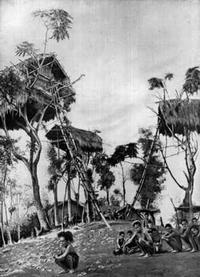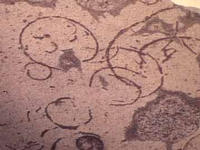 Marshall Sahlins is the author of Stone-Age Economics, which is an interesting read, in part about gift economies and how pre-historic economic systems weren't as miserable as they're commonly believed to be. Here is something from the article The Original Affluent Society: Marshall Sahlins is the author of Stone-Age Economics, which is an interesting read, in part about gift economies and how pre-historic economic systems weren't as miserable as they're commonly believed to be. Here is something from the article The Original Affluent Society:"There are two possible courses to affluence. Wants may be "easily satisfied" either by producing much or desiring little The familiar conception, the Galbraithean way- based on the concept of market economies- states that man's wants are great, not to say infinite, whereas his means are limited, although they can be improved. Thus, the gap between means and ends can be narrowed by industrial productivity, at least to the point that "urgent goods" become plentiful. But there is also a Zen road to affluence, which states that human material wants are finite and few, and technical means unchanging but on the whole adequate. Adopting the Zen strategy, a people can enjoy an unparalleled material plenty - with a low standard of living. That, I think, describes the hunters. And it helps explain some of their more curious economic behaviour: their "prodigality" for example- the inclination to consume at once all stocks on hand, as if they had it made. Free from market obsessions of scarcity, hunters' economic propensities may be more consistently predicated on abundance than our own." Sahlins explains how typical hunter-gatherers work 3-5 hours per day on acquiring food, and they have plenty of time for leisure. For that matter, they have a schedule that most civilized people would be sort of envious about. The more 'civilized' we become, the harder we tend to work, and the less time we have for leisure. He also makes some interesting distinctions between primitive living and poverty. In hunter-gatherer cultures starvation would be pretty much unthinkable."The world's most primitive people have few possessions. but they are not poor. Poverty is not a certain small amount of goods, nor is it just a relation between means and ends; above all it is a relation between people. Poverty is a social status. As such it is the invention of civilisation. It has grown with civilisation, at once as an invidious distinction between classes and more importantly as a tributary relation that can render agrarian peasants more susceptible to natural catastrophes than any winter camp of Alaskan Eskimo." I'm not sure what we can learn here, other than that it is possible to successfully live very simply and modestly. There must be some kind of point that applies also to a technological civilization. A just-in-time kind of thinking. We could very well arrange our world so that nobody ever has to starve and so we only work a few hours per day. From what I hear, only 2-3 percent of our work relates to actual production, and from my own observation, the majority of human work is inefficient or unnecessary, just arranged to keep people busy. So, why can't we have a an efficient and productive, but leisurely and relaxed, high tech society, where it would be unthinkable that basic needs wouldn't be filled?
[ Organization | 2003-03-31 06:18 | | PermaLink ] More >
|
 Marshall Sahlins is the author of Stone-Age Economics, which is an interesting read, in part about gift economies and how pre-historic economic systems weren't as miserable as they're commonly believed to be. Here is something from the article The Original Affluent Society:
Marshall Sahlins is the author of Stone-Age Economics, which is an interesting read, in part about gift economies and how pre-historic economic systems weren't as miserable as they're commonly believed to be. Here is something from the article The Original Affluent Society: Scientists have discovered a way of recognizing the signs of life in rock formations. Essentially: create a digital image of the rock; then compress the image file. The more the file shrinks, the more likely it is that life was responsible for building the layers.
Scientists have discovered a way of recognizing the signs of life in rock formations. Essentially: create a digital image of the rock; then compress the image file. The more the file shrinks, the more likely it is that life was responsible for building the layers.